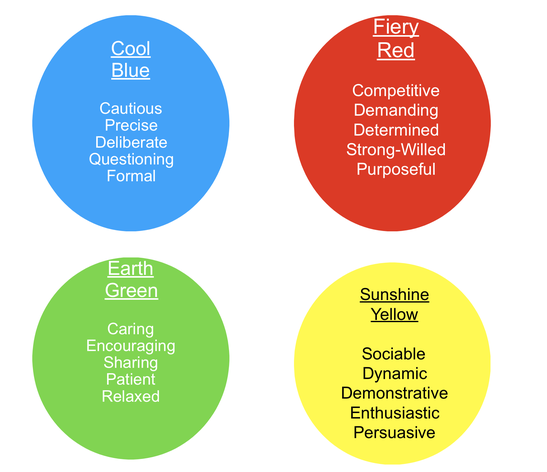I am not in any formal leadership position, but I have informal leadership roles as an anesthesiologist working in the OR. Because of this, I have taken leadership courses to help me navigate these roles. I also have had interpersonal challenges at home and at work. The first person who comes to mind when I think of these challenges is my lovely husband of 23 years, Mike.
I found the leadership course “Leadership begins with self-awareness” (https://joulecma.ca/learn/leadership-begins-with-self-awareness) particularly useful. It has given me more self-awareness and improved my understanding of others at home and at work.
Color energies
Central to this course is the concept of four personality types, each associated with a color (energy) and a certain behavioral phenotype. The Insight Discovery Color Energies, covered in the course, are explained in the following diagram.

Each of us has elements of all these energies, though we usually have a dominant one and one we are uncomfortable with. These energies are expressed in contexts such as work or play.
Each of the energies has specific motivators:
- Cool blue is accuracy and understanding.
- Earth green is harmony and value.
- Fiery red is results and action.
- Sunshine yellow is acknowledgement and involvement.
Each of these personalities brings work preferences, styles, areas of focus, likes, dislikes, strengths, behaviors under stress and ways that remedy stress. Understanding these in ourselves and others can enable us to use this knowledge optimally at personal and institutional levels. For example, I am dominantly the blue and green colors, and the course has helped me become more aware of the motivations of people who are red and yellow. At the institutional level, this information might be useful for tasks such as creating a committee to address a particular organizational problem.
Welcome to Insights Discovery (https://youtu.be/rPszqOmtV8g) summarizes the above. Interestingly, the Alberta Medical Association uses Insights Discovery to foster positive dynamics in our association.
Emotional quotient/intelligence
The second concept introduced in the course is emotional quotient/intelligence (EQ). Daniel Goleman defines EQ by how well we handle ourselves and our relationships. He describes four domains:
- self-awareness
- self-management
- empathy
- skilled relationships
Course reports
Participants in the course do an online assessment, including a Myers Briggs Type Inventory prior to the course. At the course, participants receive two reports. The first is your Insights Personal Profile, which reports on your personality style or combination of color energies. It summarizes how you interact with others, how you make decisions, your strengths and weakness, your value to the team, your communication style, your blind spots, your communication with your opposite type and your suggested areas for development.
The second report, your Workplace Report, assesses your emotional intelligence (EQ - i 2.0). The score represents the following areas and discusses the impact of these traits and any strategies for action:
- self-perception (self-regard/self-actualization/emotional self-awareness)
- stress management (flexibility, stress tolerance, optimism)
- decision making (problem solving, reality testing, impulse control)
- self-expression (emotional expression, assertiveness, independence)
- interpersonal skills (interpersonal relationships, empathy, social responsibility)
Through lectures and group activities, participants review the above in depth and with other medical colleagues.
Application
There is increasing interest in improving diversity, equity and inclusion in medical culture. We need to collectively develop a better understanding of personality styles, emotional intelligence, the concept of “the behavior spectrum,” and principled communication. Understanding this diversity among us can improve communication, teamwork and ultimately patient care and safety.
On a personal note, understanding our similarities and our differences also can only help improve our relationships with the most important people in our lives: our partners, kids, families and friends.
Improving self-awareness highlights our talents, our challenges and our psychological development throughout our lives. It shows us that underneath it all, we are much more similar than different. Simply put, we are all only human.
References available upon request.
